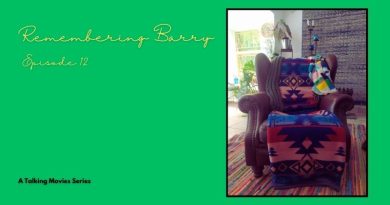The Art of Documentary Filmmaking – Episode 4
Welcome to Talking Movies. In episode 4 of The Art of Documentary Filmmaking, we continue the conversation with international documentarian Stuart Tanner, who directed The Seeds of Sovereignty, and Matthew Kalil, who is a regular guest on Talking Movies.
MK: Do you think like having said that in the current political climate, I’m referring obviously to the USA at the moment, but not just the USA, Russia, China, it seems that people in power really want to scare not just their populations, but everyone. What’s the sort of role of documentary currently in the current political climate?
ST: Well, I think it has as large a role as ever, maybe a larger role than ever. I mean, one of the great things that’s happened, of course, is that everyone can make a documentary in a way like everybody can create a pretty fine piece of music that’s mastered or make a film or, you know, so many different things because of the digital revolution, the cost of a 4K camera and everything that you need to make a documentary has come down from what used to be $150,000 just for a camera, let alone everything else. So that’s the classic thing of democratising everything, but that also means that a huge amount of content being generated everywhere.
So you really got to have that focus in terms of moving things up a level, up a notch and keep that going to make your work stand out and get somewhere. But it does mean that, you know, one of the things with documentary is about voices, is about showing things in the world which maybe are hidden from view, telling stories that are suppressed by a state or by a group. So that does open up possibilities in terms of the very small cameras, the very light cameras, being able to move things digitally out of a country and so on.
ST (cont’d): But the other side of that is, I don’t think we would have been able to do the story in Xinjiang anymore of the Uyghurs. Why? Because in China, surveillance now is so all-encompassing. You are filmed all the time by cameras everywhere with face recognition and so on. The surveillance side of things has just gone crazy. So you both have massive increase in being watched along with a technological advancement that allows you to stretch the boundaries in your own way and do things yourself and be independent. So both things are happening at the same time. But I think that where it comes to state actors who have that such power of surveillance, like in China, then things have got extremely difficult to be able to speak up, say anything.
You know, documentary filmmaking for me seems to be a lot about this pursuit for truth. And I think for audiences, most people are thinking what they’re seeing in the documentary is a very unfiltered perspective. I think people will naturally think, well, it’s a documentary. It’s real life. It’s a fly-on-the-wall sort of account of what’s happening here.
So it must be true. There’s a naivety to it because it’s called a documentary. It’s a document. I watched a film. It was actually quite a shock for me because being in the film industry for so long, that was a lot of what I was thinking about documentary filmmaking. And then I heard that the director had actually fabricated an entire scene and made it as if it was the real thing, just because they didn’t have the rights to actually film that particular scene, which was quite instrumental in the overall story.
ST: Well, it’s not allowed. It’s definitely 100% a no-no. You cannot fictionalise anything in a documentary. If you do recreate something, then you have to have it clearly labelled that this is a reconstruction. And that has to be there. And it’s very, very important. If you allow for recreating something or a sort of fictional imagination of something, but you’re not telling the audience that that’s the case, well, obviously what happens is that they lose faith in the whole thing. I know from career experience that the few occasions that I have come across, I remember there was a case at Channel 4 television. I remember there was a case in Sky News during the Iraq war. I was out there myself. I knew the person who was caught. Basically, they filmed something that was a launch of missiles, but it was an exercise. But they broadcast it as an actual kind of firing of missiles during the war. That was enough for them to lose their job.
ST (cont’d): There was another filmmaker who fabricated for Channel 4. I think it was trafficking of drugs from a South American country. And they had fabricated parts of it and hadn’t said that it was recreations or fabrications. They also lost their credibility. I think that has to be the consequence. I mean, I have been in situations in documentary where something hasn’t worked out, where you haven’t got the footage. Well, your answer is you can’t fabricate it and you can’t just recreate it and then take that home and say, hey, it’s like we got it. No. If there’s a hole, there’s a hole. Tough luck. That’s part of the challenge of documentary filmmaking. That means when something does go right, when you do get into something which is a revelation exposing something that’s been hidden and so on, which is difficult to get, then obviously it has a lot of meaning and it’s important and it’s powerful.




